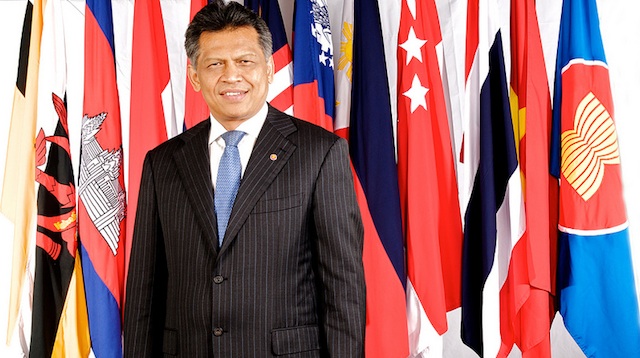SUMMARY
This is AI generated summarization, which may have errors. For context, always refer to the full article.

PHNOM PENH, Cambodia – The Association of Southeast Asian Nations (ASEAN) should move together as one in dealing with disputes over the South China Sea (West Philippine Sea), the regional bloc chief said on Saturday, November 17.
ASEAN Secretary-General Surin Pitsuwan, whose term ends next year, said the challenges facing ASEAN today demand unity.
“I think the situation is going to demand that ASEAN move in one direction together,” the former Thai foreign minister noted at a press conference on the eve of the 21st summit of the organization.
Surin added that “the challenges are getting closer to home, affecting confidence, having some implications on foreign investments coming in, concerns about the safety, concerns about free access, concerns about energy and security.”
COC still in the works
The 10-member ASEAN has not yet come up with a Code of Conduct (COC) for the disputed area that will be binding to everyone, including Asian superpower China.
The Declaration on the Conduct of Parties in the South China Sea, signed in 2002, has so far failed to resolve the issue and is non-binding, as was proven this year during the standoff between China and the Philippines over Scarborough Shoal.
“All these things, I think, are kind of putting a sense of urgency on all the ASEAN countries,” Surin said.
Current ASEAN chair Cambodia earlier stressed that the 10 foreign ministers had not set a timeframe for the crafting of a new COC after their meeting on Saturday.
Last July and for the first time in its history, the regional bloc failed to come up with a joint statement on the sea disputes after Cambodia — a staunch China ally — blocked efforts by the Philippines and Vietnam, two of the claimant parties.
China, Taiwan, and four ASEAN members (the Philippines, Vietnam, Malaysia, and Brunei) all claim certain parts of the South China Sea, but China asserts its claims over virtually the whole area.
Challenges in the future
Surin admitted that the ASEAN continues to encounter big challenges in the future.
“We have some hiccups along the way but both sides, all sides, committed to communicate or to convey a message to the global community that things are under control,” he said.
Whether or not it is approved in the near future, Surin expects the new COC to be “sanctified, to be binding, to be ratified at the end of the process, whenever that is.”
ASEAN is eager to work to achieve it, and China should also be interested, he said.
The secretary-general finally lauded proposals like Indonesia’s to establish a hotline among Southeast Asian countries that would help them reach each other if problems arise in the absence of a COC.
“I think it’s a pragmatic proposal. I think it will be helpful. I think it is part of the confidence-building measures that we will establish.” – Rappler.com
Add a comment
How does this make you feel?
There are no comments yet. Add your comment to start the conversation.